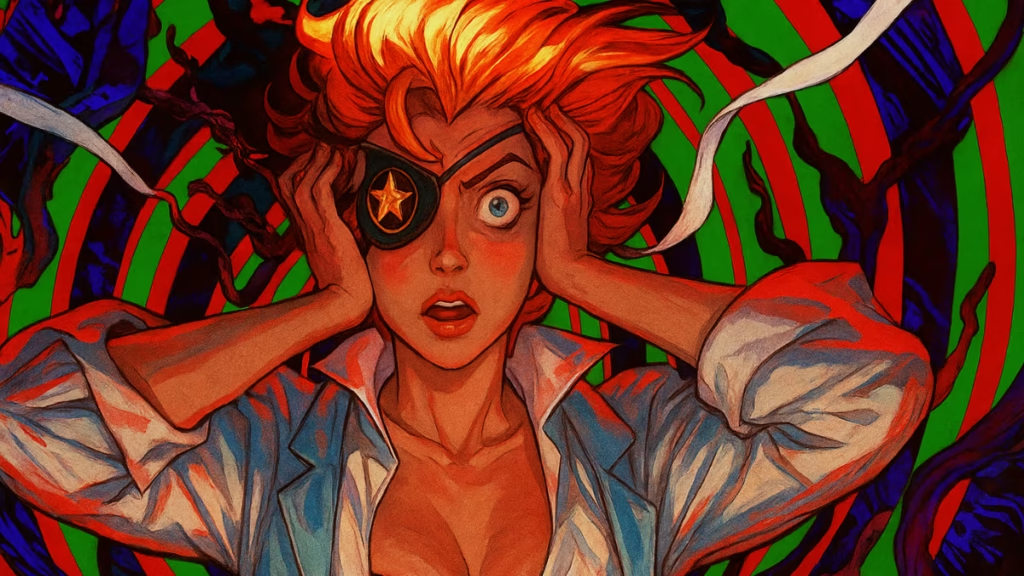When Hidetaka “SWERY” Suehiro and Goichi “Suda51” Suda announced a collaboration, expectations soared. Both are known for surreal, offbeat, and often divisive cult classics like Deadly Premonition and Killer7. Their joint project, Hotel Barcelona, arrives as a roguelite steeped in horror tropes, bizarre humor, and experimental mechanics. But does this haunted hotel welcome players in or push them away?

Setting the Stage: Welcome to the Hotel
You play as Justine, a federal marshal burdened with tragedy. Her father was murdered under mysterious circumstances, and her path of vengeance leads her to the cursed Hotel Barcelona, perched on the border of Pennsylvania and West Virginia. Justine isn’t alone — she shares her mind with Dr. Carnival, the soul of a serial killer. Their uneasy partnership fuels both combat and narrative, with Carnival lending strength while questioning Justine’s morality at every step.
The hotel itself serves as the hub: a bar run by an eccentric bartender obsessed with ears, a pinball table, and NPCs offering odd services, from casinos to weapon upgrades. It’s a quirky environment, but one that feels slightly underused compared to its potential.
Gameplay Loop: Roguelite Roots with a Twist
Like most roguelites, Hotel Barcelona follows a familiar rhythm:
- Select a stage.
- Choose a melee weapon and a ranged weapon.
- Clear rooms filled with enemies and modifiers.
- Reach a boss, win (or die), and repeat.
Each death resets your progress, but upgrades purchased with in-game cash and collected “materials” gradually make future runs more manageable. Permanent skill trees add depth, with stat buffs and new moves that eventually open up Justine’s initially limited toolkit.
Where the game stands out is its Slasher Phantoms system. Every run is recorded, and your past Justines reappear as ghostly allies in later attempts. Up to four can join you simultaneously, replaying your exact actions — even special attacks — which transforms failure into a form of progress. It’s chaotic, occasionally causing performance stutters, but remains one of the game’s most innovative ideas.
Combat: Heavy, Bloody, and Often Clunky
Combat is built around light and heavy melee strikes, ranged shots, blocks, parries, and an ultimate attack powered by Dr. Carnival. A Blood Splatter Gauge fills with successful hits, rewarding aggression with devastating screen-clearing moves. Lose momentum — by taking damage, touching water, or pausing attacks — and the gauge drains away.
Unfortunately, while the mechanics sound exciting, execution is inconsistent. Weapons range from buzzsaws and axes to shotguns, but most feel weightless or sluggish. Early on, Justine’s moveset is restricted, and enemies deal brutal damage, often wiping out huge chunks of health with a single hit. Compared to genre leaders like Hades or Dead Cells, the combat lacks polish and responsiveness.
Progression and Systems
Hotel Barcelona layers its roguelite progression with unique, if uneven, mechanics:
- Door Choices: At the end of each stage, doors lead to different bonuses — healing, speed boosts, or buffs. To keep your phantoms, you must pick the same doors as in previous runs, forcing tough tradeoffs.
- Weapon Perks & Gambling: Weapons can be enhanced, but perks often boil down to small conditional bonuses (like +2% crit in rain). Major upgrades rely on a gambling mini-game with low success chances, making progress feel random rather than earned.
- Cosmetics: Alternate outfits exist but unlock through random chest drops, meaning some players might grind for hours before finding one.
These quirks fit the game’s eccentric tone but can frustrate players looking for cleaner, more reliable systems.
Story and Atmosphere
True to SWERY and Suda51’s style, Hotel Barcelona is drenched in weirdness. Conversations veer into surreal comedy or dark introspection, often referencing horror classics like The Shining and Friday the 13th. The eccentric cast — from closet monsters to casino operators — keeps the hotel lively. Voice acting, particularly in Japanese, helps bring the bizarre script to life.
The narrative, however, isn’t always consistent. While its revenge plot provides motivation, pacing issues and awkward dialogue sometimes undercut the intrigue. Still, for fans of these auteurs, the charm lies in the chaos.
Technical Performance
During review playthroughs, performance hiccups were frequent. Slasher Phantoms occasionally caused freezes at stage start, and crashes interrupted long runs — though autosaves prevented major progress loss. These issues don’t ruin the game but highlight a lack of polish that stands out next to smoother roguelites.
Verdict: Who Should Check In?
Hotel Barcelona is a paradox. It’s stylish, imaginative, and occasionally brilliant — especially with its Slasher Phantoms mechanic and horror-homage atmosphere. Yet it’s also clunky, frustrating, and technically rough.
If you love weird games that experiment boldly and don’t mind uneven execution, Hotel Barcelona could become a cult favorite, much like the creators’ past works. But if you’re seeking tight, fluid combat and balanced progression, you may want to book your roguelite stay elsewhere.
Final Score: 7/10
A fascinating but flawed roguelite. Brilliant ideas trapped inside an uneven execution — very on-brand for SWERY and Suda51. Play Now!
Read More:

